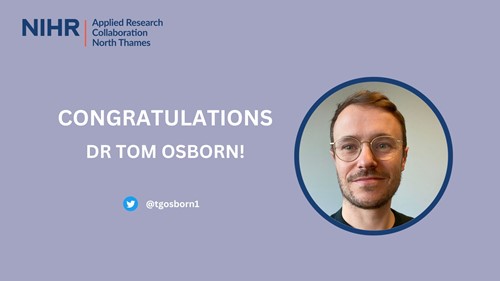We are delighted that Dr Tom Osborn, former PhD student with NIHR ARC North Thames, recently passed his viva with minor corrections. We spoke to Tom about his research and what he has gained from his experience with the ARC.

Tell us about the context and the focus of your research!
There has been a fivefold increase in the number of students declaring a mental health difficulty to their institution over the last decade, leaving student services struggling to meet demand. There is universal concern about the increasing prevalence of suicide and self-harm in this demographic group. It is likely that problems accessing appropriate mental health care are not borne equally across the student population in London, but this question has not yet been investigated.
This PhD project explored whether mental health services in London are meeting the needs of university students, and identifying whether service provision could be improved, and if so, how this might be done. Qualitative interviews with students and professionals were conducted, and data from a UK population cohort dataset was used to address this aim.
What did you find?
While the findings suggest that attending university may be, on average, protective for student mental health it may also increase stress and risk in certain students. The findings suggested vulnerabilities may be located in how needs are identified, how support is navigated to, how effectively mental health needs can be conveyed to people they are seeking help from. It suggested in a context of a fragmented health system and rising demand for health care due to increase and changing needs of the student population, access may have deteriorated for students with severe mental health challenges, certain international students, and those from select 'non-traditional' student backgrounds in recent times.
What did you gain from working with the ARC?
I felt that I was part of a community of researchers, and members of the public who were coming together to understand and solve important issues in the North Thames region that had national and international relevance. I felt there were so many opportunities and friendly and encouraging people who wanted to help. This was a huge part of being able to complete and learn so much during my PhD.
I particularly benefited from the opportunities to present and receive feedback in scientific meetings, patient and public involvement, and a peer group of PhD students – all of which improved the quality of my work.
What advice would you give to others working in ARCs?
Think through clearly the applied aspects of your research and think through what potential impact and relevance it is likely to have.

 27 Nov 2023
27 Nov 2023
